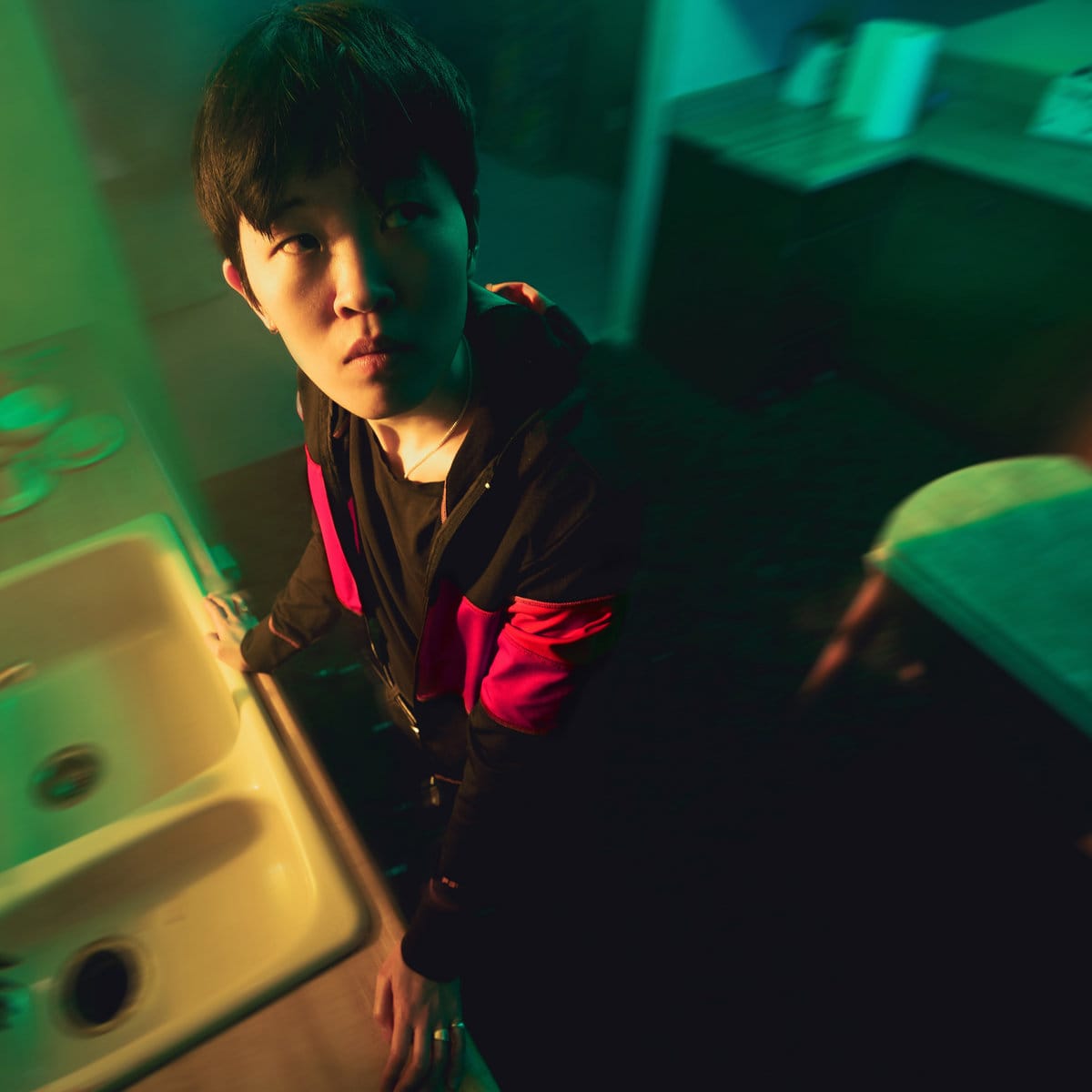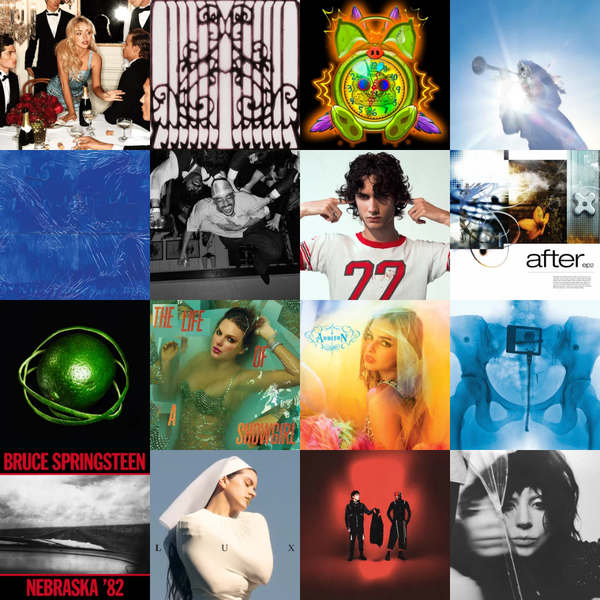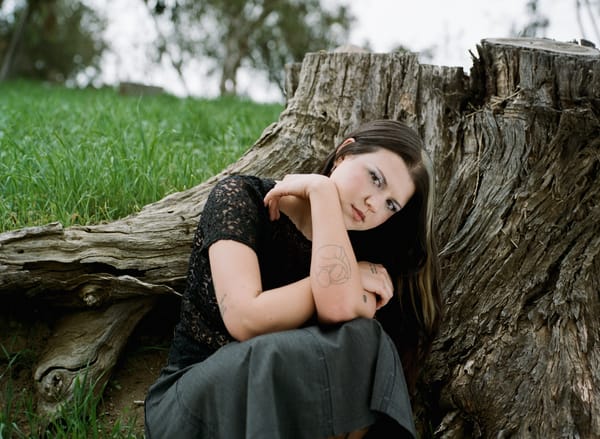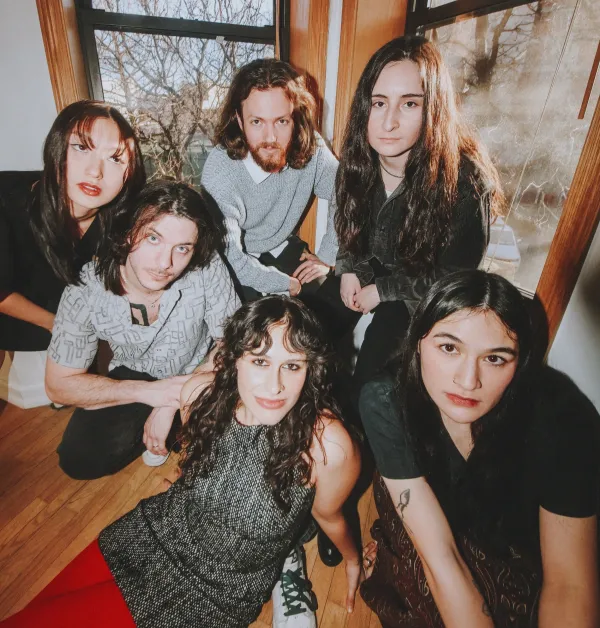Beauty In The Breakdown: NoSo - “Sugar” and “You’re No Man”

I love NoSo’s When Are You Leaving a lot - a lush record that’s still light on its feet and never feels too intense. Lyrically, it's frequently a gut punch. I wrote the artist bio for the album; here’s an excerpt:
On “You’re No Man” he’s in bed with a woman, but isn’t seen as himself; on “Nara”, he’s seen as himself, but doesn’t feel loved. We’re never really sure whether these are projected insecurities or what the other person really feels, but that just adds to the discomfort underlying the record’s lyrics. That’s until the partner on “But You Want Him”, beneath the saxophone and gated drums, confirms his worst fears: “I’m reminded of/How you missed white men/So simple and tame/Eyes dilating.” Unconventional one-liners throughout the album like “I still find you in/demeanors and tones” and “When you hurt me you listen/Therefore it could not be you” are bound to stick in the brain – just one example of Hwong’s clear strength of turning a phrase. Few songwriters are articulating such experiences as precisely as Hwong does.
Baek walked me through his live multitracks, with stories of working with Jack Tatum of Wild Nothing and Bartees Strange. No screenshots, but it's fascinating to look at his journey from a respected guitarist in LA to a musician known for sparseness.
How did you get into music production?
It became just more out of convenience than anything. When I was in school, I was working with different producers, but everyone was so busy and they would say, oh, I could do this day this week, but then if we're working with a drummer, it's going to have to be a few a month from now. So I was just getting really tired. And so I started just demoing my own music just for the purposes of wanting it to be faster. And then I ended up writing “Suburbia” entirely as an instrumental first, and then singing over it, and that opened up the doors for songwriting, and then I just focused more on it after that.
You did most of the first record, Stay Proud of Me, yourself. Did the process change between the two records?
I produced six of the songs entirely alone. And then for a couple of the other ones, Sugar I took to Jack Tatum of Wild Nothing to Co-Produce on, and that was because I just felt like I hit a ceiling with my creativity on it. And that's just how my protocol is in general. There are certain things that it's nice for me to be entirely on as a producer, but then if I feel like I've hit a ceiling, then it's nice to tap on other people.
A lot of producers will throw everything at the song to prove that they’re a good producer. These are very sparse songs; how do you know when you’ve done enough? Do you start with a million things and then pair it back?
That used to be my process, but after my first record, I learned it's really hard for the mixing process, and especially I learned if there's already one part doing something that's serving it as an important part, that it doesn't have to be doubled by something else to make a mix sound cleaner. I realized sometimes it can really muddy the waters by adding too many things to make it more exciting. If I'm listening to it from a mixing perspective for the future, and if everything's just getting muddy, then I only add parts when I'm sure this is actually helping the song. From going to music school and always trying to prove myself as a guitarist, and now as a producer, that mentality can creep in it sometimes. But I'm always trying to think about what's actually practical for the song. The guitar is also really simple on pretty much almost every song on this record, which was also different for me.
I almost wonder if that has something to do with transition, like no longer needing to prove yourself and no longer being held to the identity of “guitarist virtuoso who went to USC.” It takes the pressure off if you're literally identifying as a different person. Does that make sense?
It comes with age also; I feel less inclined to have to prove myself on every single song now. Especially on songs like “Let It Die”, there's so much going on guitar wise, but they're all really simple parts. But similar to what you were saying earlier about when a song is done, I just kept on revisiting it with fresh ears and being like, “this song is not suitable for showing [others].” There has to be enough to make it feel dynamic. And that could be a single note on the guitar, and that's appropriate for the song. Something that's really helped me is being like, "there shouldn't be an ego on this song". It's just doing what's right for the track.
Sugar
Can you talk about working with Jack Tatum?
I was writing a bunch of different songs leading up to the trip to Virginia [to record], and I was really sick, and I was just writing songs regardless. And then “Sugar” was something that I made as an instrumental first, and then I sang over it, and then he was like, “oh, let's go with this because it has a melody”. It was actually the problem child. We had another song we were working on that didn't end up making the cut, because we thought that was the stronger song, but every day we were just struggling to figure out “Sugar.” It was a really challenging song, instrumentally. Every single part is fighting against each other, but it's really easy on the ears, which is something that I'm now realizing is a difficult thing to achieve. After I had some time and I was listening to both of the songs, it just was so clear that Sugar was the better song.
These songs have a more confident vocal performance from you. When you were singing them, were there any vocalists you had in mind that you were trying to channel?
For Sugar, the eighties were a big reference point. I know when I was there, Jack showed me [sophisti-pop group] Prefab Sprout, which I loved. The 80s is my favorite era of music. And then we referenced that song that's in Call Me By Your Name -
"Love My Way" by the Psychedelic Furs?
On the guitar I was definitely thinking of Nile Rogers, like I’m Coming Out or any other guitar work he’s done.
First I want to ask about the pizzicato strings. Are those real?
They're programmed. I did a plucky sound on one of my guitars that has a mute on it for that sound in the original demo. I can't remember entirely if it still made the final cut, but I know that it was just a bunch of layers of Keyscape. My guitar might be in there really, really buried. I put a bunch of different layers. The synth plucks on this song are entirely Junos; we also used a Super 6 synth. It's like a layer underneath, but for the choruses and for a lot of the really lush sounds, we used that Super 6. I was there for a couple of days and we were working on this one in between the other songs, so my memory's a little bit fuzzy.
Is the other song just not coming out?
It's never going to come out. This one is just much more interesting.
There are so many different hooks in this song - in the chorus you have that chicken-scratch Nile Rodgers-y guitar; can you talk about playing that?
We were really trying anything. We did fully strummed chords at first, but the idea was for it to be reminiscent of the 80s. It’s hard to perform it and sing at the same time!
You were recently on The Late Show with Stephen Colbert, and you were singing and playing at the same time there!
For a lot of songs on this record, I had to practice. I wrote a lot of the guitar parts before I sang on them. On my first record, I wrote a lot of the songs while playing at the same time, and so it was just an easy translation. But this was different with some of the written parts, especially when I'm playing lead lines, singing at the same time was working a different muscle.
A lot of the low end is cut on the guitars in the final mix. Was that a challenge making everything bed together when you were working with Dave?
No, this was actually probably one of the easier songs throughout the mixing process. It felt weirdly the most straightforward, even though there's a lot going on. But yeah, he did a really good job with this one.
And the drums here were real? There are songs like "Nara" where they're clearly programmed, and then other songs like “A Beautiful Boy” that are more live.
This was Dan Bailey. He did drums on pretty much every song besides Nara. Yeah, he played drums on every single song that has drums present. Bailey, who plays drums on this song and on all the others, is an excellent engineer. He engineers all the drum sounds himself, depending on the song. So that was a really lucky get. You’re No Man was made with Bartees in Baltimore. The rest of the record was just me in my room.
And so when you're producing, are you layering for the more processed songs like this? Are you layering drums? Are you doing any drum replacement stuff like that, or processing it in a certain way to make it feel less, to feel more like an eighties drum machine?
Dan is really good at gauging the vibe of the song and matching it. Jack is so knowledgeable about eighties music, and so he processed the drums so that they could sound a little bit less like a live kit, because I don't think they really entirely read as live drums on the song. But they still have a lot of energy.
It does sound basically what a drum machine would do, but just a little bit of humanity in there.
Yeah, exactly.
One of my favorite details is the echo on the words “I fell for your…” Was that something that you came up with in the production?
We came up with that during the production. I tracked a bunch of background vocals when I got home from Virginia, because it was just missing that, and I'm weird about people recording my vocals. I recorded the lead final vocals and my background vocals at home afterwards. That's always been my process. I'm specific about that. I grew up singing in choirs, and so I've always loved different kinds of contrasting melodies.
You’re No Man
You worked with Bartees Strange on a few songs here; can you talk about working with them?
This was another one where I made a demo and then I brought it to them. I just wanted it to sound bigger and more exciting.
I’m also excited to break down the very weird sound after the first chorus of You're No Man.
Do you mean that riff, that really heavy riff that's right after it.
Is it a guitar? Is it a synth?
I put it through a Little Altar Boy It ended up sounding bizarre which was fun. But yeah, that's something that I explored with guitar. There's a lot of sounds on the record that are jarring and ambiguous, but it’s ultimately guitar. I use this pedal called the Shallow Water. I record all guitar parts through a Walrus Audio amp modeling pedal. I don't really use real amps live or in the studio because it's so noisy. When I got to Bartees we added another sound on top of it; it might've been a Moog.
We also had a Korg Polysix. He has a few really underrated synths; this and the Roland D-50, which I also fell in love with, which is what Enya uses. I loved how lush and beautiful it was. And then there was a sub-bass Bartees had which we also used a lot.
Where do you think you’re going next?
I really fell in love with techno music also this year, within the last few years. And there's just so many things that I want to explore when I listen to dance music and house music and those kinds of things. It's really, it's like a whole different world, and it'd be interesting.
I’d love a house era from you!
“Dad Made Toast!” is the closest I've gotten to a house track.
Bartees does a lot of music in that direction, like Flagey God from the first record.
It was also really interesting to see the way that he works, but we only had a few instruments. We made that with a guitar and an OP-1, which has always been such an intimidating instrument to me. But it was good for me to see. It's such a cool song, but it's like the process was just so silly and fun. And that's sometimes what a collaboration needs.


